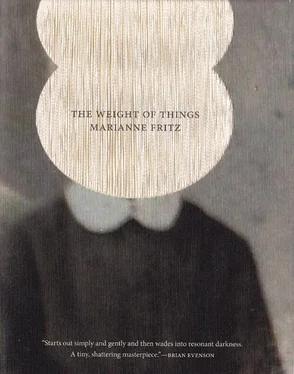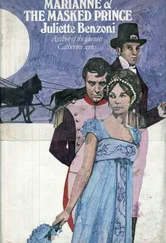THEY WAIT FOR WILHELM
That evening Berta decided, without a single “on-the-one-hand” or “on-the-other,” no longer to dole out further lessons to her children about the weight of things. Instead, she would try to introduce them to life as such through stories she would invent more or less from scratch and tell them night after night, and Berta Schrei was a good storyteller, at least at these moments. She would tell these stories of her own invention — they hardly ever had happy endings — and then she would wait an hour, two hours, three. After the third she felt secure in her hope that the weight of things had given up its pursuit of her children, and that Rudolf and Little Berta, ferried over now to the realm of dreams, were safe and sound, far from the grasp of the wrenching and molding hands of life.
“That’s all it is. The three of us are just too caught up in the world, too superficial, somehow. What we lack is inwardness, a belief in ourselves.”
Berta could hear the wrathful voice of Wilhelmine: “Berta! What’s to become of your children? They’ll end up losing their heads just like your doomed Rudolf!”
Berta looked thoughtfully at the clothesline that was stretched from the window frame to a hook that Wilhelm had nailed in over the stove, where their wet clothes were now hanging.
“Wilhelmine. Yes. Yes,” Berta said, and wiped her eyes with the back of her hand. For Berta, Wilhelmine was the embodiment of life as such , the way it spoke to her, the way it prophesied a dismal end for her, for her and her children.
“Somehow we just do everything wrong. Somehow we just don’t fit,” Berta had thought, crouched down with one arm around Little Berta, the other around Rudolf, sitting between the children in the new car, while Wilhelm, the chauffeur, said nothing, his eyes fixed rigidly on the road.
“He knows it. Yes. Of course. Everyone knows it.”
Later, Berta felt the need to verify the intuitions that had struck her on the drive home.
She’d crept into the bedroom, knelt down by Little Berta’s bed, and in the soft half-light of the lamp compared Little Berta to the Madonna from the painting. She hadn’t been wrong; even scrutinizing the girl so closely, even with such careful consideration, the resemblance was still there.
“When Berta sleeps, she looks just like our Madonna. Not just outwardly, not just superficially. It is the inward gaze of sleep. It’s what silence does for her,” she murmured to herself.
Around midnight Berta was sitting on her bed; upright; a rigid pillar; with a strange gaze fixed rigidly on her daughter’s face.
“If only Little Berta could always sleep this way, she would look like our Madonna forever. If only she could always sleep this way — if.” In her mind, Berta worked and reworked this thought, which sprang from the basic resemblance she had noticed in her child, but she neither spoke of it aloud nor even murmured it to herself. It was just a thought; nothing more and nothing less.
She waited up for the chauffeur Wilhelm until four in the morning; sitting upright in bed; rigid and with that same strange gaze fixed on her daughter’s face.
At around four-thirty in the morning, Berta finally fell asleep, only to be jolted awake by Wilhelm: “Stop that screaming! You’ll wake the children! Berta! Stop that screaming!”
It was too late. Rudolf and Little Berta sat straight up in their beds, terrified, then shot sinister glances at their mother, who said to them, finally shaken out of her sleep, “It’s nothing. Everything’s fine. I was just dreaming.”
Wilhelm shook his head, more dumbfounded than annoyed, lay back down, said, “What were you dreaming about, then?” and immediately turned away from her onto his side: “I’m tired. Wake me around eleven. We’re driving to Felsenstein.”
“To Felsenstein?”
Wilhelm mumbled something not even he could understand, and soon afterward the regular course of his breathing made clear that he had fallen asleep once more.
“So. So,” Berta Schrei said, “to Felsenstein,” then looked perplexed from Wilhelm to Little Berta, from Little Berta to Rudolf, and from Rudolf to Little Berta once more.
“The resemblance really is astonishing. I need to think about it more,” Berta said to herself, then bent over Wilhelm, and with a push of the button on the lamp on the night table, draped the room in darkness.
“This is no coincidence. And the dream I had is also no coincidence.”
A CHARMINGLY UNASSUMING CREATURE INDEED
Berta Schrei, who saw in her dreams allusions to life as such , and therefore found them worth taking to heart, lay on her back in bed, her eyes turned toward the window, and decided it would be better to stay awake. She looked at the blinds, remembered how Wilhelm had carved the wooden slats himself in the workshop of his colleague Ferdinand Wolf, and how Wilhelmine had sewn the fabric holding them together.
When the work was over, Berta had offered a shot of schnapps to her laborers, and they all stood in the bedroom to marvel at this masterpiece: Ferdinand Wolf, Wilhelmine and Wilhelm, Rudolf and Little Berta.
“Really. It’s beyond belief. How did you ever do it?” Berta asked, and stared at Wilhelmine, astonished. Wilhelmine responded to her astonishment with pity, saying, “Well, it’s nothing. You take some old fabric out of your dresser, you reuse it, andsoonandsoforth. Anyone can do it.”
At that Wilhelm nodded, stroked Berta’s cheek, and said, “Don’t rack your brains over it. The important thing is we have our blinds now. What do you say, Ferdinand?”
Ferdinand held out his shot glass to Berta a fourth time, let it be filled with good schnapps, drained it in one go, and declared with admiration, “I never knew a chauffeur to understand anything other than motors, speedometers, and the joy of steering passengers around the countryside — but I can’t say I’m surprised. Yes, I have long suspected there was more to you than that! And now I know for certain.”
After delivering this little speech, Ferdinand felt a most urgent need for a fifth shot, and Berta was amazed how quickly Wilhelmine noticed this. With a jerk, the schnapps bottle was wrenched from Berta’s hands, then passed back, and the glass was emptied straightaway once more.
“Berta. Keep your eyes open,” said Wilhelmine in a slightly reproachful tone, shaking her head. “You’re always off somewhere lost in your thoughts.”
Berta clapped her hand over her mouth; she cried out, “Oh, forgive me, Mr. Wolf! I was just stunned at the sight of so much made from so little.”
Ferdinand Wolf nodded knowingly and said, “So it is, Mrs. Schrei my dear, so it is. If you keep your eyes open and have a bit of common sense, the improbable becomes probable.” Rudolf yanked at his mother’s skirt, she bent down to him, and he whispered in her ear, “Help me, Mama, help me!” He pointed to the floor where a small puddle was forming. Berta took the boy by the hand, excused herself, and tried to cover up Rudolf’s shameful mishap insofar as was possible. She said, “Our able craftsmen will have to excuse us for a moment. I imagine they may enjoy a bit of time to themselves anyhow, and now they don’t have to worry about our meddling.”
The able craftsmen Ferdinand and Wilhelm broke out into hearty laughter. Wilhelm clapped his Berta good-naturedly on the shoulder and Ferdinand Wolf said, “What a charmingly unassuming creature.”
But Wilhelmine threw her hands up in horror, pointed toward the puddle, and cried out, “Berta! What an absolute mess! When will you finally teach your boy how to use the toilet?”
Little Berta wrinkled her nose and said, “It wasn’t me, Uncle Wolf, that doesn’t happen to me anymore!” Uncle Wolf cleared his throat, stroked Little Berta’s cheek, and Wilhelmine said, “Rudolf! Take your little sister as an example!”
Читать дальше











